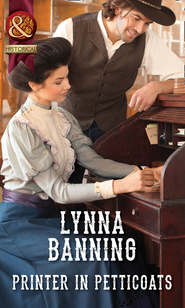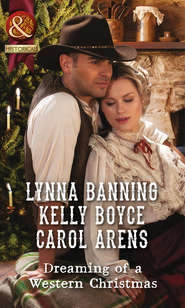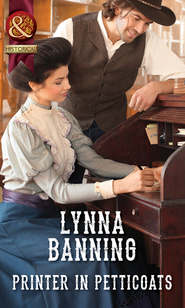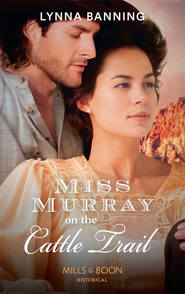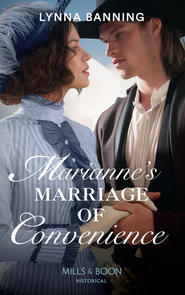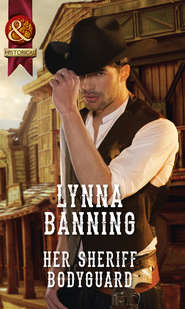По всем вопросам обращайтесь на: info@litportal.ru
(©) 2003-2025.
✖
Loner's Lady
Настройки чтения
Размер шрифта
Высота строк
Поля
She sank onto a ladder-back chair, closed her eyes and fanned herself with her apron. Mr. Flint leaned over her.
“You all right?”
“Oh, right enough. Just winded.” When she opened her eyelids a glass of water sat on the table before her, and he had settled his long frame onto the chair across from her.
At first she tried very hard not to look at his bare chest. After an awkward silence, she gave up. She liked looking at his tanned, well-muscled torso, even slicked with perspiration and smudged with dirt. It would be an experience to bake her cake with a half-dressed helper.
“I’ll go wash up and get my shirt off the clothesline. Should be dry by now.”
“I would offer to iron it for you, but…”
“Doesn’t need ironing, Ellen. Don’t need to get fancied up to make a cake.”
A flicker of regret teased at her.
At the back door, he turned and held her gaze with an expression she couldn’t read. Not concern, exactly. Just a kind of awareness. Recognition.
Ellen swallowed over a lump the size of an egg and stood to fetch her blue mixing bowl.
Chapter Six
I nside the consulting room in his office, Dr. James Callahan set his hat on the shelf, shed his summer linen jacket and loosened his tie. Part of him hated getting gussied up just to walk past the boardinghouse each morning. But another part of him, the part that had tumbled head-over-coattails in love twenty-five years ago, wanted to see her again.
He had watched Iona Everett since the year she had turned seventeen, the year he had come out to Willow Flat at his sister’s request. Iona had grown from a shy, soft-spoken girl into a lushly beautiful young woman who played the piano and taught Sunday school. Then, at twenty-two, she had married town banker Thaddeus Everett, and Doc Callahan’s heart had slowly turned to stone. Not even doting on his sister’s surviving child, Ellen, over the years had assuaged the hurt.
Twelve years later, Iona had been widowed, and Doc resumed his morning walks past the tree-shaded, three-story home she’d turned into a boardinghouse. Today she had been sitting in a white wicker chair on the wide front veranda, a vision in lavender dimity. She must be in her early forties now, Doc thought. She looked no more than thirty, her skin still satin-smooth, her amber-colored hair kissed with silver.
He’d tipped his black top hat, and when she slowly inclined her head in response, as she always did, he had hurried on by, his tongue too tangled to speak.
Now he hung his jacket on the hook behind the consulting room door and closed his eyes in disgust. What ails you, man? You’d think you’d never seen a pretty woman before!
Oh, that he had, many times. Always the same pretty woman. Iona. Even her name was beautiful.
With a sigh Doc straightened the stack of medical journals on his crammed desk and readied his office for the first patient of the day. Physician, heal thyself!
All afternoon he would rehearse what he would say to her, and tomorrow morning, he resolved, instead of just tipping his hat and striding on down the street, he would muster up his courage and speak to her.
Jess dangled the ruffly white apron from one thumb and faced Ellen. “Last time I wore an apron, it was waterproof linen and I was taking off a man’s leg. I feel ridiculous in this frilly little bit of—”
“Put it on,” she ordered. “Unless you like getting flour dusted all over your front.” Against her will, her gaze flicked to his well-worn jeans. The thought of his lean, hard body encased in her soft feminine garment made her grin. “’Course, you don’t have to.” She tried hard not to laugh.
“What’s so funny?” he demanded.
She raised her eyes, worked to keep them riveted on the second button of his shirt. She couldn’t tell him. Putting her apron on a man like him was like spreading frosting on a tree stump. “Your shirt is still damp,” she improvised.
“Bet it’s cooler than yours. It’s hot in here, and it’ll be worse when we stoke up the fire in the stove.”
He slipped the neck band over his head and tied the apron strings behind him. “Look at me.” He shook his head in disbelief at what he was doing. As a final gesture he fluffed out the ruffled hem.
Ellen laughed out loud. “You look quite fetching.”
“Feel damn silly if you want the truth.”
“Who’s going to know, Mr. Flint? We’re private. You said so yourself not ten minutes ago.”
He shot her a withering look. Ellen’s heart doubled its beat until she saw the corners of his lips twitch. When the telltale twitch blossomed into a real smile, her heart skittered again. His sharp, hawklike face relaxed when he smiled. And those wary, dark blue eyes lost the hungry look that made her so curious about him. When his eyes softened, something different shone in their depths. Something arresting. She liked his face when he smiled.
She grabbed her red painted receipt box and thumbed through the slips of paper. “You will find butter in the cooler. Sugar’s in the small barrel, flour in the big one.”
With a sideways look he eyed the swinging door she indicated, then returned his gaze to her. “How much of each?”
She pretended to read the recipe, though she knew the ingredients and the measurements by heart. For some reason she needed to be doing something with her hands. A smiling Jason Flint made her even more uneasy.
“One teacup-size lump of butter, two of brown sugar, three of flour. Take two bowls. Put the butter and the sugar in together.”
He gathered up two china mixing bowls from the shelf next to the stove and disappeared into the pantry. She heard him open the sugar barrel, then the flour barrel, which had a cover so tight-fitting it squeaked. He emerged with a bowl in each hand; in one, a glob of butter the size of his fist rode on a mound of brown sugar.
“What next?” he said as he plunked the bowls on the table.
“Cream the butter and the sugar.”
He cocked his head at her and frowned. “Cream? You didn’t tell me to get cream.”
Ellen laughed out loud. “You don’t need cream. That just means to mix the butter and the sugar together. Here, use a fork.”
He took the utensil offered and began to squash the ball of butter into the sugar. Something about the way he used the fork, slowly pressing it down through the soft butter, then lifting the sugar up from the bottom of the bowl, sent an odd thrill into her belly. His hands—that was it. His fingers moved with deliberation at the task, his motions unhurried and thorough.
He walked the same way, Ellen thought. Loose-limbed and sure of himself, as if he were stalking something. She wrenched her gaze away and began cracking eggs into a soup bowl.
“Three eggs,” she said, just to make a noise in the suddenly quiet room. “When the butter and sugar are mixed, dump in the eggs. Then I’ll beat it while you sift the flour.”
He nodded, still frowning, and pushed the bowl of butter and sugar within her reach. She stirred the contents smooth, then started on the first hundred strokes with the wooden spoon. It was hard to do while seated; after fifty strokes, her arm ached and she gave it up.
“Baking soda,” she announced when he looked at her for instruction. “Then add some spices to the flour. Cinnamon and nutmeg and crushed anise seeds.” She pointed to the small savories cabinet hanging on the wall next to the sink. “A teaspoonful of each.”
His care in measuring out the spices struck her as unusual. Few men would proceed with such delicacy, spilling nothing, gently grinding the anise with her mortar and pestle. The rich scent of licorice filled the warm kitchen. Anise always sent her imagination flying away to far-off places that smelled of exotic spices—ginger and cardamom—instead of farm dust. She closed her eyes and breathed deeply.
“Tired?”
“Certainly not. I have four hundred more strokes to do after you mix in the flour and a little buttermilk and some vanilla extract. Then I will be tired.”
“How much is ‘a little buttermilk’?” His look of genuine puzzlement touched her. A man like him was a fish out of water in a kitchen. But he was trying, she’d give him that.
“Just enough so it looks right,” she said gently. “The amount’s different every time. Cooking is an inexact art, Mr. Flint.”
“Yes, ma’am.” He squinted over the measuring, working his lower lip between his teeth as he dipped the spoon and leveled the spices off with his forefinger. Completely absorbed in the task, he seemed unaware of Ellen’s sharp perusal of his face until he glanced up suddenly and his eyes met hers.
An unspoken question appeared in his gaze, but he said nothing. Instead, he raised one dark eyebrow in a rakish challenge of some sort.






